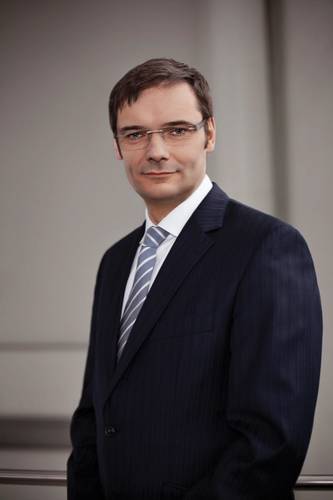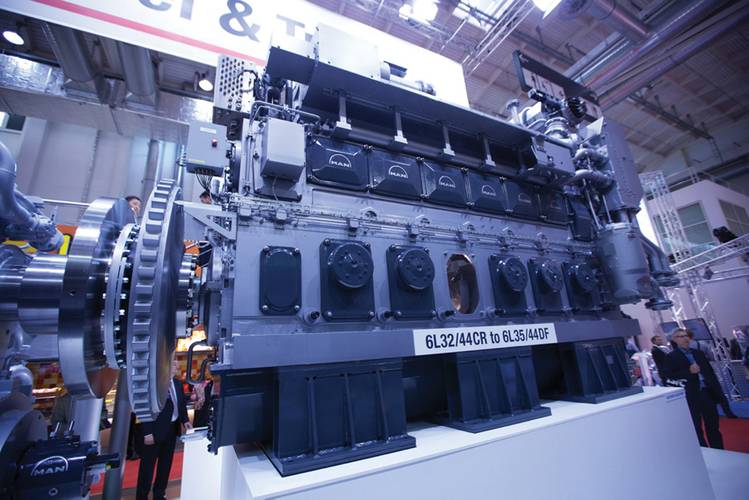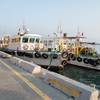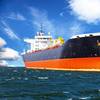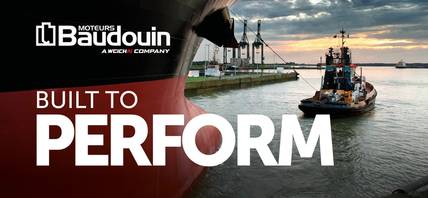Think GLOBAL Act LOCAL
As any maritime power supplier could surely attest, resting on one’s laurels is not an option in today’s market: a generally stagnate global industrial situation, mixed with environmental regulations and fuel prices that are simultaneously spiraling higher. In tandem, vessel owners of every genre make demands that inherently at odds with one another: competitive pricing and seamless performance; reduced emission and reduced fuel consumption; with the seamless delivery of advanced technologies and service, all geared to help vessel owners better manage fleets and their bottom lines better.
All in a day’s work for Dr. René Umlauft, CEO of MAN Diesel & Turbo.
Dr. Umlauft took the helm a little more than a year ago, and took some time on the occasion of SMM in Hamburg, Germany, to share with Maritime Reporter his insights on building and maintaining a diversified power provider that is a global company with an increasingly sharper eye on local activities.
A Diverse Pedigree
MAN Diesel & Turbo is an indelible player in global maritime circles, but Dr. Umlauft is a relative newcomer, having spent the last 21 years of his career primarily on the power side of the business with another power company.
“I joined MAN last year, and I have a lot of experience in gas turbines, steam turbines and power plants,” said Dr. Umlauft. “I have been in this position for almost one year now, and one of the main initiatives which we decided from the outset was the introduction of our new global organization.”
Essentially, MAN Diesel & Turbo, which already has an impressive global footprint, set out to get more in touch with customers and their needs on the local and regional level, and to that end have split the world into nine regions, each with its own CEO and CFO reporting back to headquarters to one of the company’s five board members. Dr. Umlauft is specifically responsible for three regions: India, Russia (incl. CIS), and sub-Sahara Africa.
“The main point is to put the focus to the regions worldwide, and to have somebody who is the face to the region, to the customers, to the suppliers, to the government, to the press,” said Dr. Umlauft. “One person speaking with one voice to the region on behalf of MAN, and just as importantly, to MAN Diesel & Turbo internally.”
At a time when many companies are eschewing increased service to bolster the bottom line, MAN Diesel & Turbo is investing money and effort to get closer to its customers in a meaningful manner.
Dr. Umlauft reasons that clear focused customer service effectively lets it know even more about the markets served, a depth of knowledge about the customer and the region that ultimately helps the company to develop strategies short and long term.
“We are really increasing the customer focus, not only for service, where I think we are doing really well; and on the two stroke we are doing really well, but we have some fields where we can improve,” said Dr. Umlauft.
While the blueprint is finished, the plan is not yet 100% implemented as the company continues to round out its top management teams in the nine regions, a process Dr. Umlauft estimates will be completed in early 2013.
The Power Play
While Dr. Umlauft is not long-tenured in the marine business, he explains that there are many similarities between shore side and at-sea businesses.
“I think that the main point is to steer the company through economically difficult times!,” said Dr. Umlauft. It is with this clarity of vision that he and his colleagues in management, sales, production and service have embarked to refine and in some instances redefine this historic company and its family of technical solutions. Part of the plan to extend the field presence of MAN Diesel & Turbo is the opening of several new service hubs in 2013, e.g. in Halifax, Vancouver, Dakar and Quito. “This expansion is needed to have the right service support, to be where the customer needs you to be,” he said. While he admits the tough world economy has had obvious impact on his company’s business, Dr. Umlauft is quick to point out that there are plentiful opportunities today, and enhancing the company’s regional focus will help to root them out.
“I think the prospective for the maritime business overall is difficult at this time, and I think that we have to go market segment by market segment,” said Dr. Umlauft. “We have mentioned one particularly big order and opportunity (the recently announced $33b Canadian Navy contract) and I think that worldwide the Navy business looks interesting. I have had a discussions with the Indian Navy and Indian Coast Guard regarding their plans going forward. Also, the offshore business and special vessels for offshore applications. For example, I look to Brazil, where they must go really deep to get their oil. Also, Russia looks interesting for special vessels, including icebreakers.”
While he continually touts the company’s plan to get closer on the local level, he is quick to point out that ultimately the future success of the company hinges on the product, or more specifically the MAN Diesel & Turbo’s ability to maintain a pipeline of technically superior solutions that are designed to meet the real world needs of its diverse two-stroke and four-stroke client bay.
“One part is knowing the customers and the individual markets better,” Dr. Umlauft said. “Another is delivering new products with higher efficiency, offering dual fuel options. The price of crude oil is the price of crude oil and I have nothing to say about that; what we have to do is come up with the products and the strategies to help our clients reduce the impact of rising fuel costs.”
Just as the company invests in expansion of service, it also invests mightily in Research & Development to ensure that its product line-up is fresh and ahead of the curve.
“Where should I start? We have the dual fuel engine L35/44 on the test bed which is running, intended for use in maritime and power plant applications. We have working on a two-stroke, we have a gas engine, meeting Tier III which is coming; we have a new high speed engine,” said Dr. Umlauft. “On the engine side, we have a lot of development, from the high speed through the two stroke low speed, moving toward environmentally friendly initiatives but also working towards greater engine efficiencies.”
In fact, from the fulfillment of technologies to comply with evolving environmental rules, Dr. Umlauft is confident his company is up for the task. “From the technical point of view, I am sure we are able to solve (the environmental) issues. The question is: are our customers able to invest in the new technology based on the new legislation, particularly in light of the ongoing sluggish world economy?”
MAN Diesel & Turbo introduced its L35/44DF engine, the latest addition to its four-stroke portfolio, at SMM 2012 in Hamburg. Spurred on by developments in environmental legislation and the strict emission limits resulting from that, the engine offers dual diesel fuel-gas running and can also be introduced as a retrofit to engines already in service.
The first prototype entered its test phase at the beginning of 2012’s second quarter at MAN Diesel & Turbo’s Augsburg facility. A V-type engine version is being developed simultaneously that will enlarge the power-output range of the company’s dual-fuel engine portfolio as part of MAN Diesel & Turbo’s market strategy.
The company is introducing the L35/44DF engine at a time where separate emissions legislation for harbors is set to come into play, in addition to the upcoming IMO Tier III emission regulations for marine applications. Accordingly, MAN Diesel & Turbo views the introduction of another engine that offers the option of operation on gaseous fuels as timely, also in the context of ship owners’ increasing environmental awareness. With the L35/44DF engine, MAN Diesel & Turbo is continuing the expansion of its product program with a dual-fuel engine based on common rail technology.
MAN Diesel & Turbo’s development objective with the new engine was to produce a high efficiency/ high specific power output unit that complied with IMO Tier II emission limits in diesel mode and IMO Tier III limits in gas operation. A high degree of fuel flexibility (HFO, MDO, MGO and natural gas) was another primary objective. With an output of 530kW/cylinder, the inline 35/44DF is available in 6 – 10 cylinder configurations, equivalent to total power outputs from 3.2 MW to 5.3 MW. This represents the highest power output available in the segment and complements that offered by the larger L51/60DF type.
The company also announced an addition to its engine program: the D7 high-speed engine which delivers a 1.5 – 5 MW output at 1,000 – 2,000 rpm and is designed to serve a broad range of applications. The company contends that the D7 closes the gap between its smallest medium-speed and largest high-speed engines and sets new standards in fuel efficiency, power/weight ratio and TBO-intervals.
It has targeted tugboats, workboats, offshore service and supply vessels, navy patrol boats, super yachts and fast ferries as its core applications. The new engine will additionally serve non-marine markets such as the offshore, onshore power generation and rail segments. It will also be available as a gas-powered version for certain applications. The D7 will play a central role in a new propulsion train devised by MAN Diesel & Turbo. Customers will be offered the engine as part of a package that includes gearboxes, propellers, switchboards, auxiliary gensets, and energy storage solutions. Orders for the new engine can be placed starting in 2014.
At a Glance
Headquarters
MAN Diesel & Turbo SE, Augsburg, Germany
Key performance indicators (2011)
Order intake 3.7B euro
Revenue 3.6B euro
Operating profit 460 euro
Headcount (as of Dec. 31)* 14,039
ROS (%) 12.7
*Including subcontracted employees
Online: www.mandieselturbo.com
Chairman of the Supervisory Board
Dr.-Ing. Georg Pachta-Reyhofen
Spokesman of the Executive Board of MAN SE, Munich
Members of the Executive Board of MAN Diesel & Turbo SE
• Dr. René Umlauft - CEO
• Dr. Hans-O. Jeske
• Arnd Löttgen
• Dr. Peter Park
• Dr. Stephan Timmermann
Products and Services
Engines & Marine Systems
• World market leader for the propulsion of seafaring vessels with a market share of around 50 per cent
• World market leader for two-stroke diesel engines for seafaring vessels with a market share of over 80 per cent
• World market leader for medium-speed, four-stroke propulsion engines
• Second on the global market as a supplier of exhaust turbochargers for two-stroke and medium-speed four-stroke diesel engines
Power Plants
• Second on the global market as a supplier of medium-speed diesel engines for stationary base load power plants
• From pure genset deliveries to semi-turnkey and turnkey power plants
• Combined heat and power plants, Diesel Combined Cycle (DCC)
• Excellent fuel flexibility: HFO, diesel, bio-fuels and gas
Turbomachinery
• Axial/radial compressors, gear-type, isothermal and screw compressors
• Up to 1,000 bar outlet pressure and volume flows of up to 1.5 million m3/hour
• Gas turbines up to 50 MW, steam turbines up to 150 MW output
• Complete turbomachinery trains including drive/auxiliary equipment, e.g. for the oil and gas industry, process industry and for power generation
• Reactors for the chemical and petrochemical industries
MAN PrimeServ
• Global spare parts provision and repair with own crew
• Online diagnosis of machinery and engines
• Conversions, status analysis, performance adjustments, machinery relocation
• Training for customers and operators in MAN’s own academies
(As published in the October 2012 edition of Maritime Reporter - www.marinelink.com)






